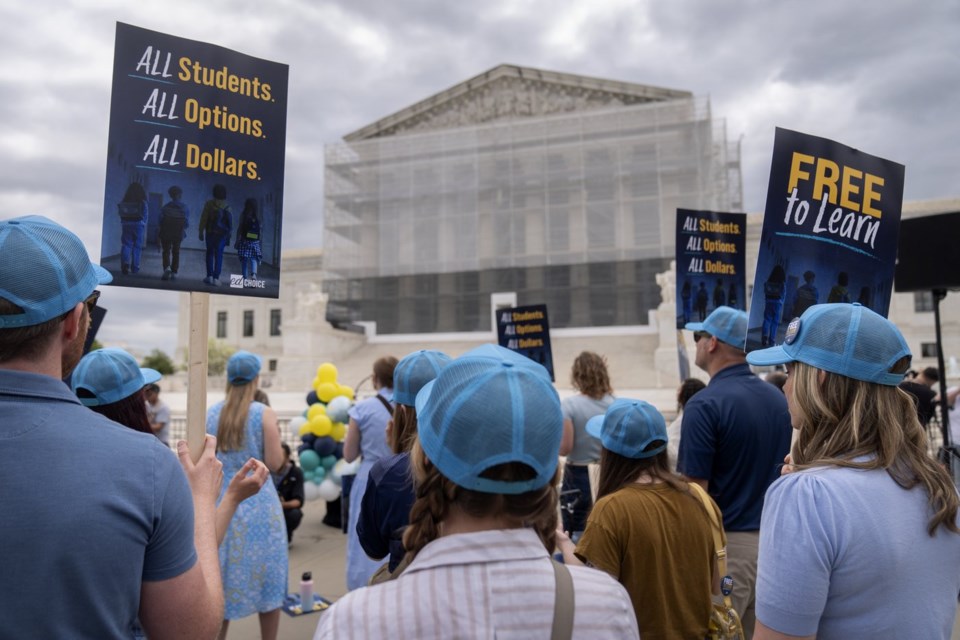WASHINGTON (AP) — Chief Justice John Roberts appears to hold the key vote over whether the Supreme Court will allow the nation's first publicly funded religious charter school in Oklahoma.
Roberts was the only justice whose vote seemed in doubt after the court heard more than two hours of arguments Wednesday in a major culture-war clash involving the separation of church and state.
The court seemed otherwise deeply divided.
Four other conservative justices seemed firmly on the side of the St. Isidore of Seville Catholic Virtual School and the state charter school board that approved it.
“They’re not asking for special treatment, not asking for favoritism,” Justice Brett Kavanaugh said. “They’re just saying, ’Don’t treat us worse because we’re religious.”
The three liberal justices seemed just as likely to vote to affirm an Oklahoma Supreme Court ruling that held that the taxpayer-funded school would entangle church and state in violation of the First Amendment.
“Charter schools are in every respect equivalent to regular public schools,” Justice Elena Kagan said.
Justice Amy Coney Barrett recused herself without explanation. Barrett previously taught law at Notre Dame and is close friends with Notre Dame law professor Nicole Garnett, a leading proponent of publicly funded religious charter schools.
If Roberts sides with the liberals, the court would be tied 4-4, an outcome that would leave the state court decision in place, but would leave the issue unresolved nationally.
If he joins his conservative colleagues, on the other hand, the court could find that the taxpayer-funded school is in line with a string of high court decisions that have allowed public funds to flow to religious entities. Those rulings were based on a different part of the First Amendment that protects religious freedom.
Roberts wrote the last three of those decisions. He acknowledged at one point that the court had previously ruled that states “couldn't exclude religious participants,” suggesting support for St. Isidore.
But he also said the state's involvement in this case is “much more comprehensive” than in the earlier ones, a point that could lead him in the other direction.
St. Isidore, a K-12 online school, had planned to start classes for its first 200 enrollees last fall, with part of its mission to evangelize its students in the Catholic faith.
Opponents warn a decision to allow the school to open would sap money from public schools and possibly upend the rules governing charter schools in almost every state.
Greg Garre, the lawyer defending the Oklahoma decision, repeatedly urged the justices to consider the broad impact of a ruling for the school.
“This is going to have a dramatic effect on charter schools across the country,” Garre said.
Representing the state charter school board, lawyer James Campbell said Oklahoma's charter school law discriminates against religion by encouraging diversity, but “deeming religion to be the wrong kind of diversity.”
The case comes to the court amid efforts, mainly in conservative-led states, to insert religion into public schools. Those include a challenged Louisiana requirement that the Ten Commandments be posted in classrooms and a mandate from Oklahoma’s state schools superintendent that the Bible be placed in public school classrooms.
St. Isidore, a K-12 online school, had planned to start classes for its first 200 enrollees last fall, with part of its mission to evangelize its students in the Catholic faith.
Opponents warn a decision to allow the school to open would sap money from public schools and possibly upend the rules governing charter schools in almost every state.
The state board and the school are backed by an array of Republican-led states and religious and conservative groups, though the case has divided some of Oklahoma’s Republican leaders.
Gov. Kevin Stitt and Superintendent of Public Instruction Ryan Walters support using public funds for religious schools, while Attorney General Gentner Drummond has opposed the idea and sued to overturn the state board’s approval of St. Isidore.
A key issue in the case is whether the school is public or private. Charter schools are deemed public in Oklahoma and the other 45 states and the District of Columbia where they operate. North Dakota recently enacted legislation allowing for charter schools.
They are free and open to all, receive state funding, abide by antidiscrimination laws and submit to oversight of curriculum and testing. But they also are run by independent boards that are not part of local public school systems.
Just under 4 million American schoolchildren, about 8%, are enrolled in charter schools.
Mark Sherman, The Associated Press



